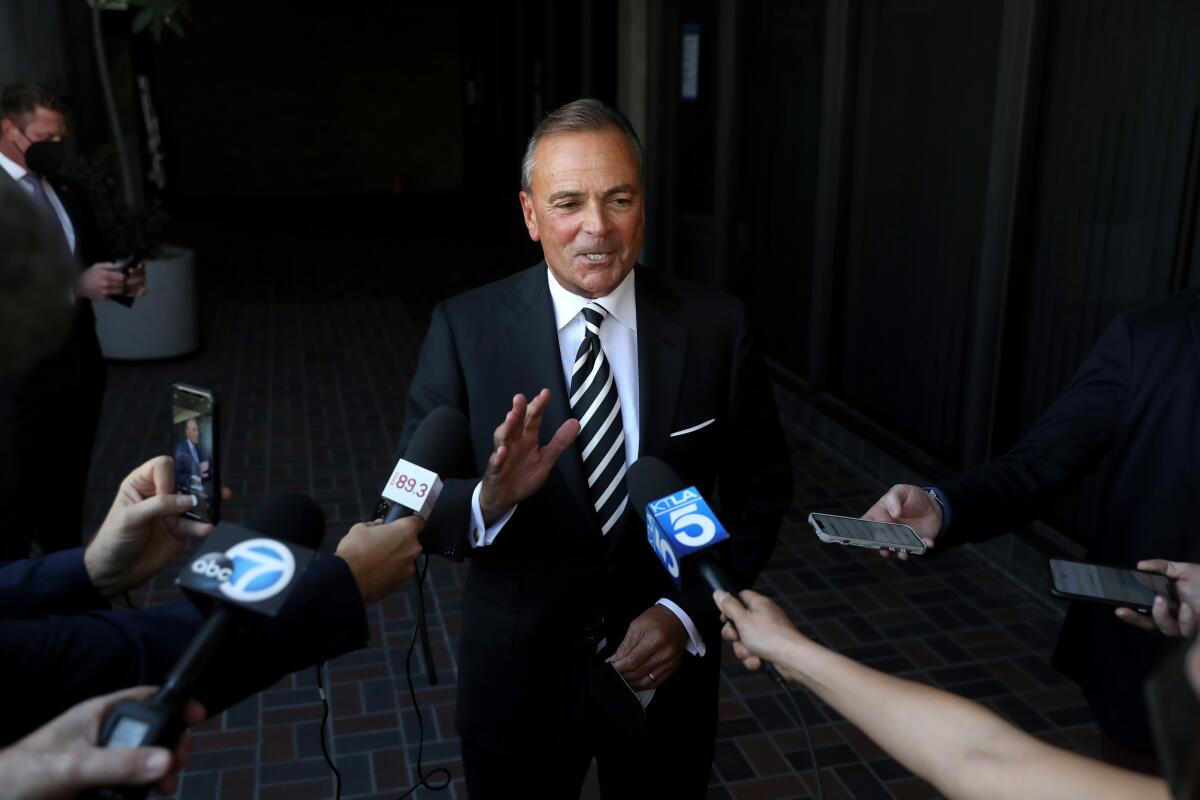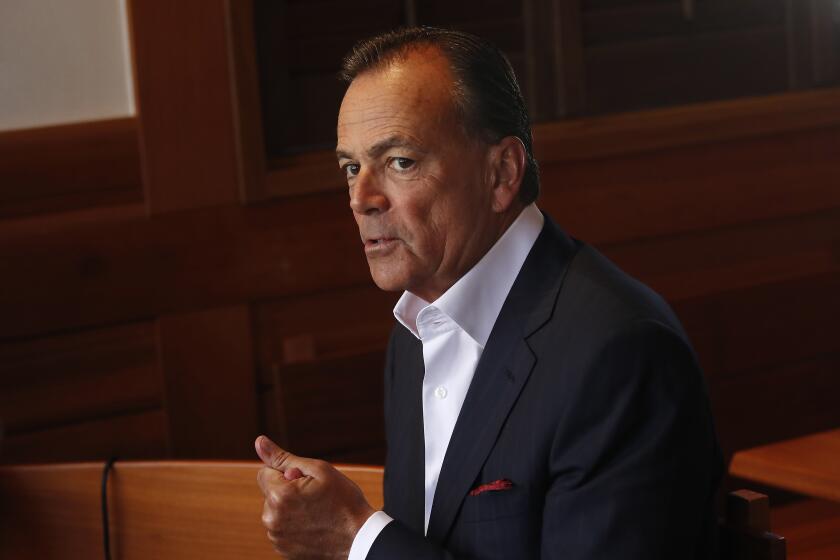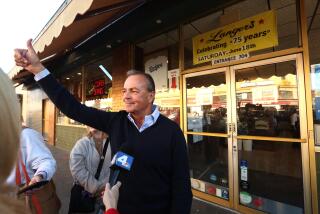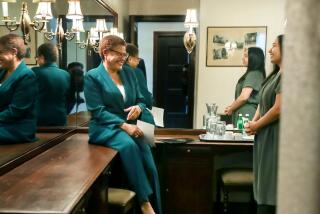Caruso wants 1,500 more officers, says he’ll put company in a blind trust

If elected mayor, Rick Caruso said Monday he wants to add 1,500 officers to the Los Angeles Police Department and promised to put his businesses in a blind trust to avoid potential conflicts of interest while he served in office.
In his first interview with The Times since he entered the race last week, Caruso — the billionaire developer of the Grove and Palisades Village shopping centers — offered the first details of how he would seek to govern the city.
He was highly critical of current officeholders, many of whom he supported in the past, saying their policies have made the city a less hospitable place to start a business or raise a family.
“I look at the electorate and think they’re lined up with me,” he said. “They’re scared. They’re frustrated. They’re angry at governments. They feel left behind. Leadership has failed them, and they want change and they want hope and they want the ability for their kids to walk to school and play in a park and not worry about homeless encampments around them and not worry about crime rising.”
Get the lowdown on L.A. politics
Sign up for our L.A. City Hall newsletter to get weekly insights, scoops and analysis.
You may occasionally receive promotional content from the Los Angeles Times.
His plan to add 1,500 officers to the LAPD puts him in line with Councilman Joe Buscaino, a rival candidate, who has said he wants to expand the LAPD to 11,000 officers.
The LAPD has about 9,500 officers, which is 200 below its authorized staffing level. Rep. Karen Bass (D-Los Angeles), who has emerged as a front-runner in the crowded field, wants to move 250 LAPD police officers out of desk jobs and into patrols and get the department back to full staffing.
“First it’s 11,000 cops, then it will be clearing homeless encampments and recalling [L.A. County Dist. Atty.] George Gascón,” said Buscaino campaign strategist Michael Trujillo, alluding to the fact that his client and Caruso have taken several similar positions. “Before you know it, Caruso will write a check to change his name to Joe Buscaino.”
Last month, Buscaino endorsed the recall effort against Gascón. Caruso didn’t go that far but was critical of a man he has known since the early 2000s when Gascón was a member of the LAPD command staff and Caruso served as the president of the Police Commission.
“George, I think, needs to stand up and say ‘there’s some things that I’ve been doing that clearly don’t work and I’m going to change,’” Caruso said. “If he isn’t prepared to change and if he wants to stay on the road that he’s on, I’m with Charlie Beck, and I think that he should step down or be recalled.”
Last week, Beck, the former LAPD chief, rescinded his endorsement of Gascón. Caruso co-hosted a fundraiser for Gascón in February 2020 but later donated $45,000 to a committee supporting incumbent Dist. Atty. Jackie Lacey, according to campaign finance disclosures.
Caruso’s wealth, listed by Forbes at $4.3 billion, means he hasn’t had to spend time fundraising, unlike the other candidates. He declined to say how much he was willing to spend on his campaign.
“You got a new candidate in this race. That candidate is going to spend a lot of money,” former Mayor Antonio Villaraigosa said over the weekend while campaigning in Pan Pacific Park with Bass, whom he has endorsed. “He comes from a part of town where they don’t know about people who suffer. They don’t know about people who go hungry. They don’t have any idea about what it is to struggle.”
Caruso said he would put his company, called Caruso, in a blind trust, meaning he would have no say in its operations or investments. If elected, he added, the firm “is not going to do any new projects in the city of L.A.” while he served as mayor.
Rick Caruso says he is still deciding whether to jump into the L.A. mayor’s race.
He was unclear about when he would step down as the head of the firm, saying only that “there’s a transition that’s going to happen.”
“I’m not into this for anything other than serving the people of Los Angeles, and I’m going to take every step that’s necessary to make sure there’s no conflict of interest, and not even an appearance of a conflict of interest,” Caruso said. He added that he’d be willing to work for a dollar a year.
He also said he would appoint an “ethics czar,” noting the recent federal indictments of three current or former councilmen in corruption cases.
On Tuesday, USC said in an email to students, faculty and alumni that Caruso will step down as chair of the school’s board of trustees “once a transition process is completed.”
He had stepped into that role in 2018 after the school was rocked by scandal following a Times investigation that found a campus gynecologist had been the subject of numerous complaints of harassment and inappropriate touching during his nearly three decades treating students.
On his plans to combat homelessness, he said “you have to end people living on the streets — period. ... It’s not right for the communities that the homeless encampments are in, and it’s not right for the people that are on the streets.”
The supply of interim housing has to be expanded dramatically, Caruso said, calling for 30,000 new beds to be constructed within his first year. He did not offer details how he would accomplish that.
The businessman, who has never held elected office, was quick to criticize the City Council for pursuing a strategy in which members are able to ban encampments in specific locations in the city. He said there needed to be a cohesive response run by the mayor.
For years, Mayor Eric Garcetti has long called for a “FEMA-like response” to homelessness. And like Bass, and election rivals including Buscaino and City Atty. Mike Feuer, Caruso invoked a response to an earthquake as the way that government must respond to the crisis on the streets.
Caruso chalked up the failure to house people as a management problem and not one necessarily having to do with a dearth of resources.
He said he wanted to better understand the relationship between the city and the county, which has long addressed the streets’ most psychologically vulnerable through the Department of Mental Health. He said something similar about the city’s relationship with the Los Angeles Homeless Services Authority.
“Money is not the problem,” he said. “We’ve got more money than the system knows what to do with. It’s the management that’s the problem, and everybody that’s running it has never been in a management position.”
More to Read
Sign up for Essential California
The most important California stories and recommendations in your inbox every morning.
You may occasionally receive promotional content from the Los Angeles Times.












